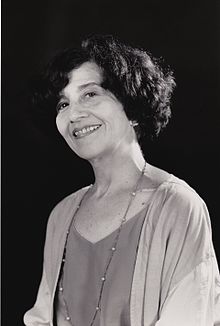
Edith Wyschogrod (June 8, 1930[1] – July 16, 2009) was an American philosopher. She received her B.A. from Hunter College in 1951 and her Ph.D. from Columbia University in 1970.[1][2]
Wyschogrod joined Rice's Religious Studies Department in 1992, as the J. Newton Rayzor Professor of Philosophy and Religious Thought; she retired in 2002, and held the title of professor emeritus from 2003.[1] Wyschogrod was a member of the American Academy of Arts and Sciences (Fellow, 1999), a Guggenheim Fellow (1995-1996), and a fellow of the National Humanities Center (1981).[1] She served one term as president of the American Academy of Religion (1993).[3]
She authored five influential books on ethics.[4] Her work centered on ethical and philosophical themes such as justice and alterity; modern philosophy in light of technologically assisted mass death; and memory and forgetting.[4]
She was the wife of philosopher Michael Wyschogrod.[5] She died July 16, 2009, in New York City at the age of 79.[4]
Books
[edit]- Crossover Queries: Dwelling with Negatives, Embodying Philosophy's Others (New York: Fordham University Press, Spring 2006), 561 pp.
- Emmanuel Levinas: The Problem of Ethical Metaphysics (The Hague: Martinus Nijhoff, 1974), 222 pp.; second edition with new introduction (New York: Fordham University Press, 2000), 260 pp.
- An Ethics of Remembering: History, Heterology and the Nameless Others (Chicago: University of Chicago Press, 1998), 304 pp.
- Saints and Postmodernism: Revisioning Moral Philosophy (Chicago: University of Chicago Press, 1990), 300 pp.
- Spirit in Ashes: Hegel, Heidegger and Man Made Mass Death (New Haven: Yale University Press, 1985, pb. 1989), 247 pp.
Books edited[1]
- The Ethical: Blackwell Readings in Continental Philosophy, co-edited with Gerald McKenny (London: Blackwell, 2002), 228 pp.
- The Enigma of Gift and Sacrifice, introduction and co-edited with Jean-Joseph Goux and Eric Boynton (New York: Fordham University Press, 2001), 186 pp.
- Lacan and Theological Discourse, co-edited with David Crownfield and Carl Raschke (Albany, NY: SUNY Press, 1989), 179 pp.
- The Phenomenon of Death: Faces of Mortality, edited with introduction and bibliography (New York: Harper and Row, 1973), 200 pp.
Honors and awards
[edit]Source:[1]
- Fellow, American Academy of Arts and Sciences, 1999–2009
- Guggenheim Fellow, 1995-1996
- President, American Academy of Religion, 1993[3]
- Woodrow Wilson Fellow, Woodrow Wilson International Center for Scholars, September 1987, January 1988
- CUNY Faculty Research Travel Awards: summers 1982, 1983 (France, Germany, Italy); summer 1987 (France, Germany, Denmark, Norway); summer 1990 (France, Poland, Hungary, East Germany)
- Fellow, National Humanities Center, Research Triangle Park, North Carolina, January–June 1981
References
[edit]- ^ a b c d e f g "Edith Wyschogrod." Contemporary Authors Online. Detroit: Gale, 2007. Accessed via Biography in Context database, 2016-10-04.
- ^ "Edith Wyschogrod". www.wyschogrod.com. Archived from the original on February 16, 2010. Retrieved 2016-10-04.
- ^ a b "Past Presidents". American Academy of Religion. Retrieved 2016-10-04.
- ^ a b c d "Edith Wyschogrod, 1930–2009", with remembrance written by Mark C. Taylor. The Chicago Blog. August 25, 2009. University of Chicago Press. Retrieved 2016-10-04.
- ^ "Michael Wyschogrod, Dean of Orthodox Jewish Theologians, Dies at 87". Tablet Magazine. December 18, 2015. Retrieved 2022-11-27.